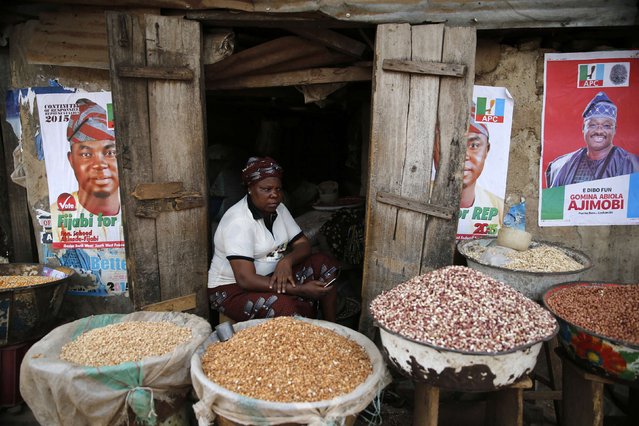
Latefat Alao, 56, a ethnic Yoruba Muslim woman, waits for customers in front of her in Beere market in Ibadan, southwest Nigeria, January 29, 2015. Much of the grain and wheat traders like Alao sell comes from the north and Boko Haram's campaign has negatively affected farmers and food markets. Reuters photographer Akintunde Akinleye photographed Nigerians and asked them about their views on the elections as well as their hopes and concerns for the country. Nigeria's agreement to delay this week's election on the advice of security forces creates a worrying echo for some of the annulment of 1993's democratic vote by a military government. The election in Africa's biggest economy, initially scheduled to take place this Saturday, was set to be the closest fought since the end of military dictatorship in 1999. President Goodluck Jonathan is seeking re-election in a contest with main opposition candidate Muhammadu Buhari, himself a former military ruler. (Photo by Akintunde Akinleye/Reuters)
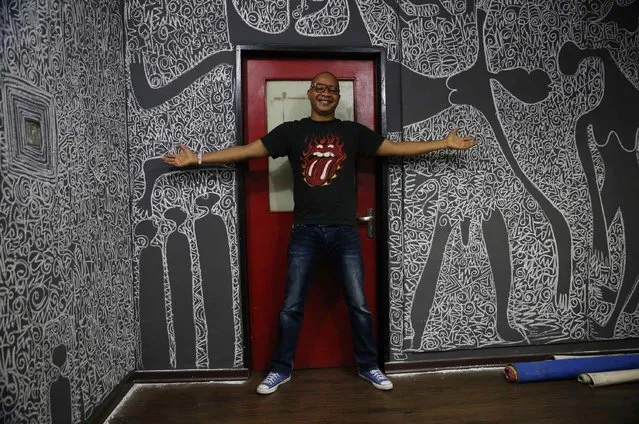
Visual Artist Victor Ehikhamenor, 45, a Christian from Nigeria's delta region, poses for a portrait in his office at Iganmu district in Nigeria's commercial capital Lagos January 29, 2015. Ehikhamenor is running a web campaign “Vote with ink not blood” as the elections in Nigeria approach. “History has proven that ink is more affordable than blood, so Nigerian citizens' blood shouldn't be cheaper than a bottle of ink. We implore all to remember this simple fact and embrace peace in every corner of our country”, Ehikhamenor said. (Photo by Akintunde Akinleye/Reuters)
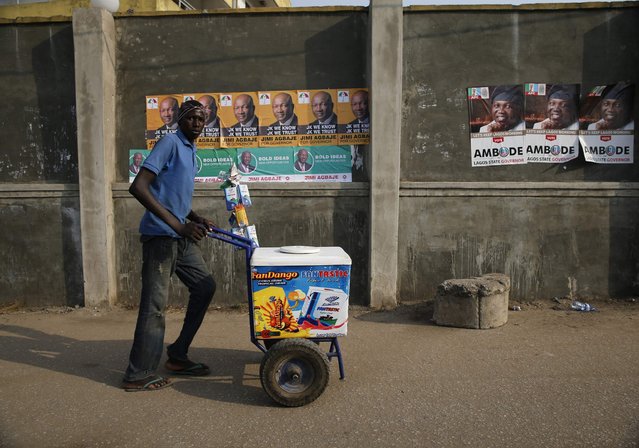
Garuba Musa, 27, an ethnic Hausa Muslim man, pushes an ice-cream cart in Ikeja district in Lagos January 26, 2015. Musa is from the north of Nigeria and hopes the forthcoming Presidential election will be peaceful but fears Boko Haram may hamper the process in the north of the country. (Photo by Akintunde Akinleye/Reuters)
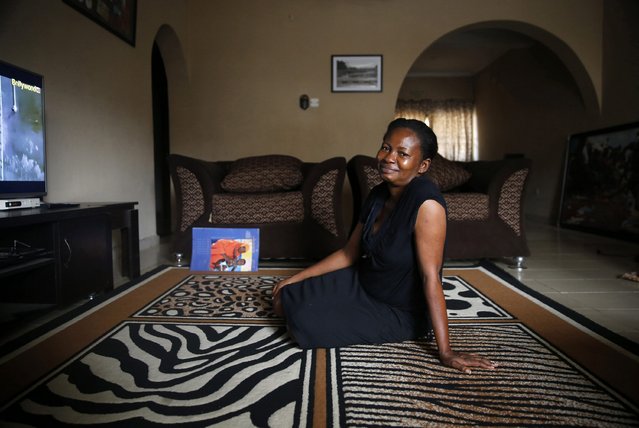
Fashion designer Omobola Omowunmi, 43, an ethnic Yoruba Christian woman, poses for a portrait in the living room of her home in Oregun district in Nigeria's commercial capital Lagos February 1, 2015. Omowunmi is optimistic that the elections will lift Nigeria from its current economic troubles if they are conducted smoothly. Speaking about the postponement she said: “The people at the helm are playing with our lives. We know that these people are trying to rig the election because opinion seems to be tilting towards favouring the opposition party but I pray for a good outcome at the end of the day”. (Photo by Akintunde Akinleye/Reuters)
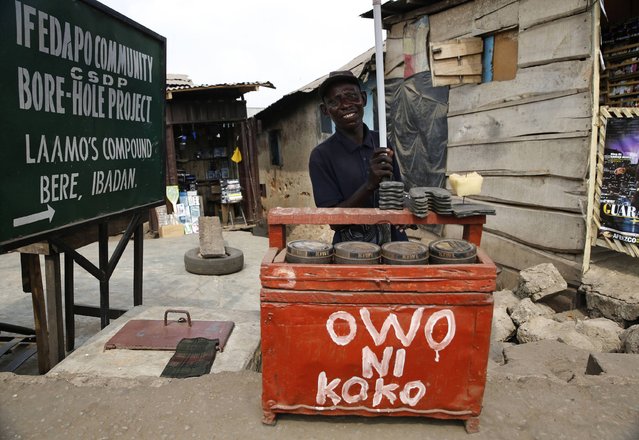
Shoe mender Mutiu Sabitiu, 40, an ethnic Yoruba Muslim, poses for a photograph at his roadside workshop in Beere district in Ibadan, southwest Nigeria January 29, 2015. Sabitiu is indifferent to the elections but hopes the best candidate emerges as president. (Photo by Akintunde Akinleye/Reuters)
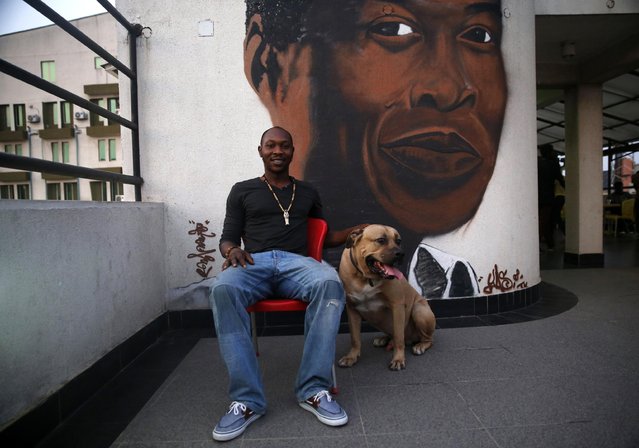
Afrobeat musician Seun Anikulapo-Kuti, 32, an ethnic Yoruba, poses with his dog on an open terrace at the Fela museum in Lagos February 1, 2015. Anikulapo-Kuti is the son of Nigeria's music legend Fela Kuti. He believes Boko Haram is not a new kind of revolutionary group but an entity created for some kind of political disturbances in Nigeria. (Photo by Akintunde Akinleye/Reuters)
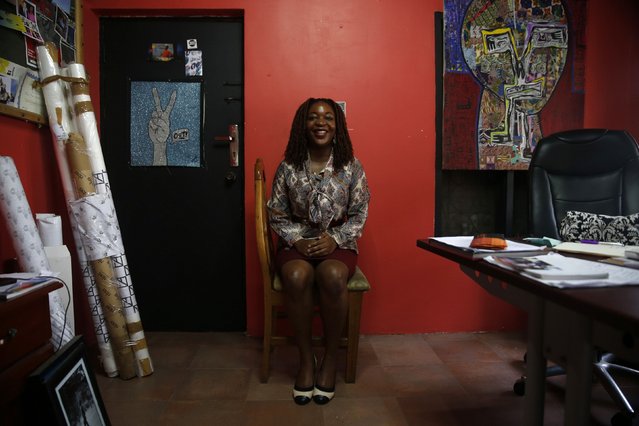
Brand Director of African Artists Foundation, Wunika Mukan, 31, sits for a portrait in her office in Nigeria's commercial capital Lagos February 10, 2015. “We are on the verge of something great however I feel that we have to get through the storm to get there. Our biggest challenge is corruption and lack of sophistication and leaders that don't necessarily see the whole picture. I find the postponement of the election to be a bad example for the rest of Nigerians, it tells us that we don't have to be ready, that we can cheat”, Mukan said. (Photo by Akintunde Akinleye/Reuters)
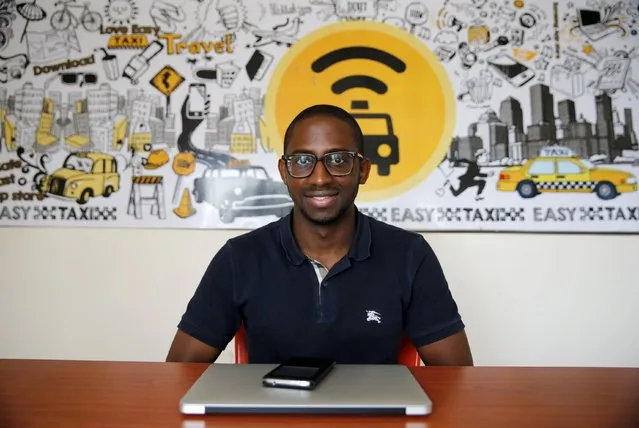
Entrepreneur Bankole Cardoso, 26, an ethnic Yoruba Christian man, sits for a portrait in his office in the Ebute Meta district of Nigeria's commercial capital Lagos January 21, 2015. Cardoso, who runs a Lagos taxi business, said that fears of kidnappings increase during elections. (Photo by Akintunde Akinleye/Reuters)
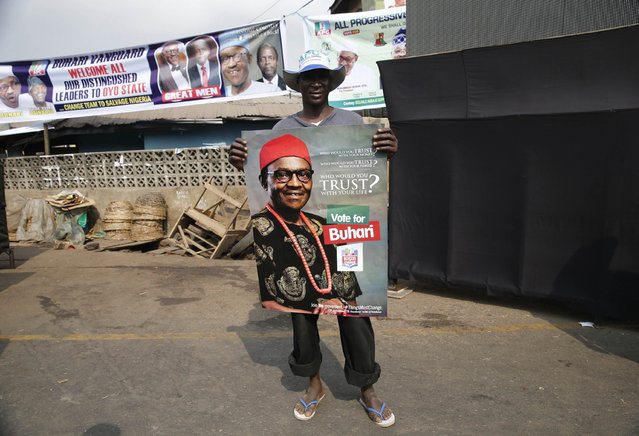
Abubakar Kadakinguda, 30, an ethnic Hausa Muslim man from the north, holds a poster campaigning for Nigeria's former military ruler and presidential candidate for All Progressives Congress (APC) Muhammadu Buhari in Ibadan, southwest Nigeria January 29, 2015. Kadakinguda believes the political challenges in Nigeria, including security issues will be fixed if Buhari becomes the next head of government in the forthcoming elections. (Photo by Akintunde Akinleye/Reuters)
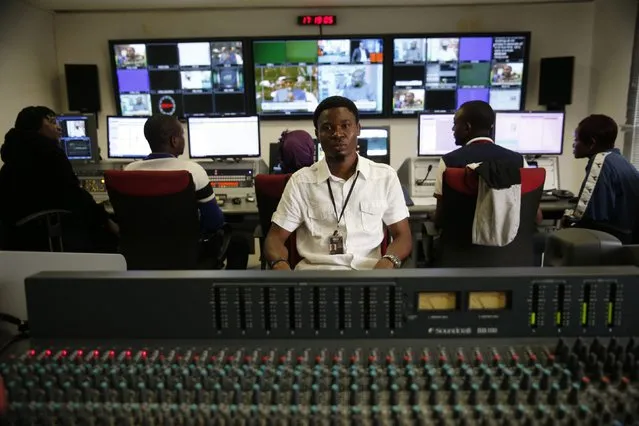
Independent television producer Dan Ikpoyi, 32, a Christian from Nigeria's delta region, sits for a portrait in a production room at a television station in Lagos January 29, 2015. Ikpoyi feels that both campaigns are creating tension within the population and says he fears for his safety while covering the vote. “The fact that the election was postponed casts a big question mark on the credibility of the election itself. The party in government is indicted in this and it means anything can happen afterwards”, Ikpoyi said. (Photo by Akintunde Akinleye/Reuters)
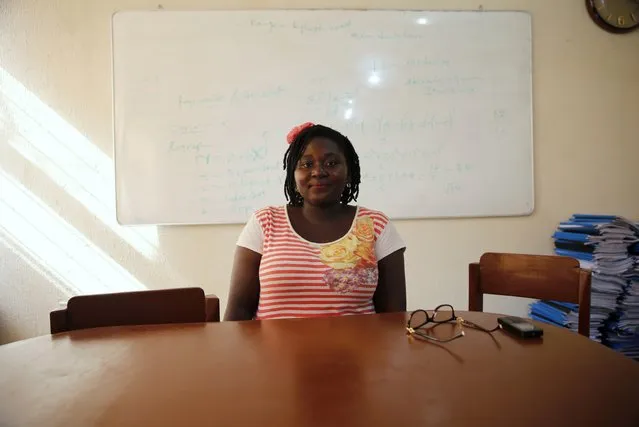
Omolade Ogunlusi, 20, a student at the University of Lagos and an ethnic Yoruba Christian, sits in a seminar room at the university campus in Akoka district in Lagos January 28, 2015. “I do not like the election postponement. I am just afraid of everything”, Ogunlusi said. (Photo by Akintunde Akinleye/Reuters)
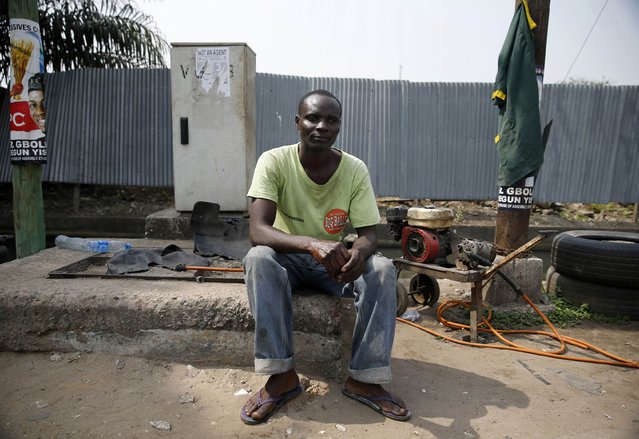
Gabriel Taiwo, 42, an ethnic Yoruba Christian man and Vulcanizer, sits for a portrait at a roadside workshop in Ikoyi district in Nigeria's commercial capital Lagos January 21, 2015. “I feel so bad that the election was postponed but there is nothing we can do now, we have to wait for the new dates – but I pray everything goes well”, Taiwo said. (Photo by Akintunde Akinleye/Reuters)
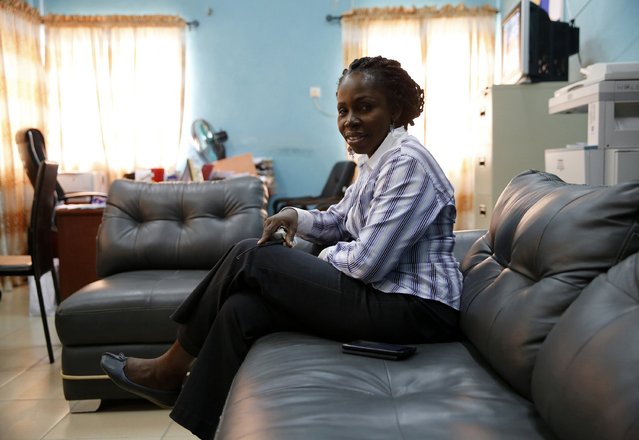
Associate Professor Abigail Ogwezzy-Ndisika, a Christian from Nigeria's delta region, sits for a portrait in her office at the University of Lagos January 26, 2015. “The Boko Haram insurgency did not start today. We have already given out a timetable to the whole world [for] the election. Why postpone it now? The problem is that the postponement may have implications for the tribunal meetings if there are litigations – However, the fact that they acted within the ambit of the law makes it a legal thing to do. If these six weeks will give them the opportunity to quell the insurgency in Nigeria, it is worth the sacrifice. But if you look at it closely it has heated the polity”, Ogwezzy-Ndisika said. (Photo by Akintunde Akinleye/Reuters)
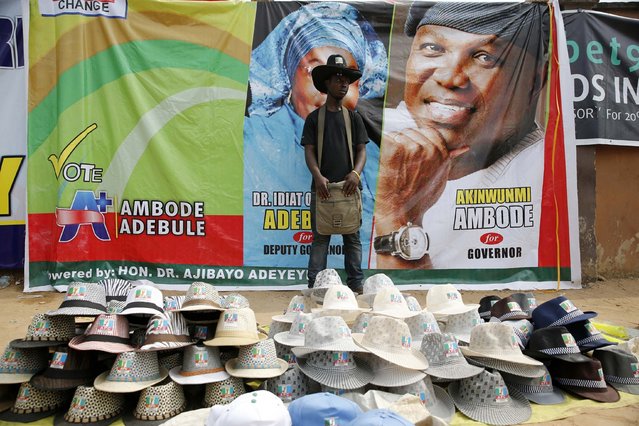
Michael Chijoke Ano, 21, who is a student and an ethnic Igbo man from Nigeria's eastern region, waits for customers during a campaign for the governorship candidate Akinwunmi Ambode, of the All Progressives Congress (APC), in Oworonshoki district in Lagos January 19, 2015. Ano sells party souvenirs to support his education and he hopes that the election is devoid of violence so that his education plans are not affected. (Photo by Akintunde Akinleye/Reuters)
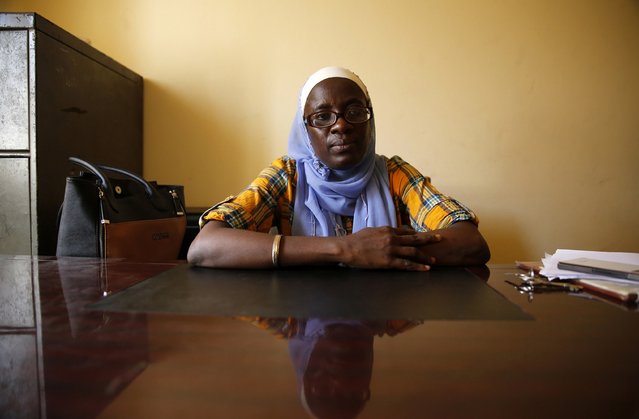
Adepate Mustapher-Koiki, 43, a Yoruba Muslim woman, who is a lecturer in Mass Communication, sits for a portrait in her office at the University of Lagos January 28, 2015. “If the issues of killing and bombing are not affecting us now, they are issue that have gotten close to us all. Whoever, emerges should look at the issue of security ... the whole scenario is disturbing our economic growth”, Mustapher-Koiki said. (Photo by Akintunde Akinleye/Reuters)
12 Feb 2015 12:44:00,
post received
0 comments
